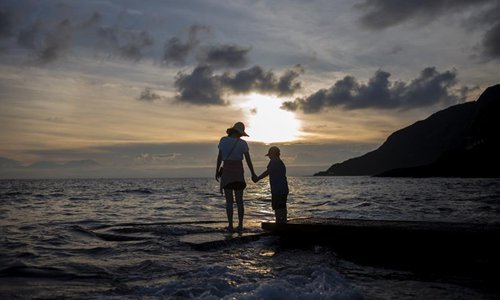HOME >> CHINA
Mainland individual trips to Taiwan discontinued due to ties in limbo
By Wang Wenwen Source:Global Times Published: 2019/7/31 21:03:40

Tourists view the sunset on the Green Island in Taitung, southeast China's Taiwan, July 23, 2019. Photo: Xinhua
A pilot program allowing residents of 47 Chinese mainland cities to travel to the island of Taiwan on individual trips will be suspended starting August 1 due to "the current cross-Straits ties," according to a notice published on the website of the Ministry of Culture and Tourism of China on Wednesday by the Association for Tourism Exchange across the Taiwan Straits.
Group trips are not affected by the ban, according to Ctrip, a leading Chinese travel agency.
Such a development is a footnote on increasingly tense cross-Straits ties, Chinese observers noted, and resulted from repeated provocative actions by the Tsai Ing-wen administration and secessionist forces on the island.
Xue Qingde, a Taiwan businessman who has been investing in Pingtan county, East China's Fujian Province, for more than a decade, told the Global Times he supports the ban even though his wife and many of his business partners are from the mainland and he wants more people-to-people exchanges between the two sides.
"It is the policies adopted by the island authorities that are causing the two sides to drift away," Xue said and listed "hostile signals" including curriculum changes at schools that tried to sway Taiwan youth away from reunification.
Xue also believed that the policy suspension was a countermeasure to Taiwan's courtship of the US.
In mid-July, Tsai visited four Caribbean "allies" with two US stopovers, which Chinese mainland analysts believed were aimed at winning support from the US for Taiwan elections in January 2020.
In early July, the US State Department proposed the sale of $2.2 billion in arms to Taiwan, which met strong criticism from the Chinese mainland.
Foreign Ministry spokesperson Geng Shuang urged the US "to stay committed to the one-China principle and the three joint communiqués, cancel this arms sale immediately and stop military ties with Taiwan to prevent further damage to China-US relations and peace and stability across the Taiwan Straits."
The Trump administration is delaying approval of the weapons sale to Taiwan as China and the US are engaging in the 12th round of trade negotiations, the New York Times reported on Wednesday.
Zhang Hua, an associate research fellow of the Institute of Taiwan Studies, Chinese Academy of Social Sciences in Beijing, told the Global Times that the travel policy suspension is clearly the result of current cross-Straits tensions.
"The separatist forces in Taiwan have become more and more rampant. The recent military exercises by the People's Liberation Army in waters near the island of Taiwan, especially around the Dongshan Island that faces Taiwan, send a strong signal to the Tsai administration that if they do not adhere to the 1992 Consensus, the peaceful and stable status quo of cross-Straits ties cannot remain," Zhang said.
The mainland has the ability, confidence and leverage to deal with provocations from Taiwan secessionist forces, he added.
According to statistics released by Taiwan's transportation departments in February, the number of mainland tourists to Taiwan in 2018 was 2.69 million, the lowest in six years.
Taiwan media estimated that individual tourists take up 60 percent of all mainland travelers and the ban will deal a heavy blow to the island's tourism and aviation industries.
A Reuters report cited an analyst who believes the ban will cost Taiwan GDP 37.5 billion Taiwan New Dollars ($1 billion), or 0.2 percentage points of GDP.
Yang Lixian, a research fellow at the Beijing-based Research Center of Cross-Straits Relations, believes the ban serves more as a tough gesture by the mainland targeting Tsai.
"Cross-Straits relations have been worsening under Tsai. The mainland will not allow the Democratic Progressive Party to destroy relations on the one hand and use economic profits from the mainland as their political achievements on the other," Yang told the Global Times.
Taiwan media reported that the ban may last six months until February 2020 and Yang noted that how long the ban will last will depend on the result of the Taiwan elections five months later.
The program that allows individual mainland tourists to travel to Taiwan began in June 2011. At first it only applied to residents of three major cities: Beijing, Shanghai and Xiamen. It gradually expanded to 47 cities by March 2015.
Ctrip told the Global Times that it has notified tourists about the ban on booking and sight-seeing platforms.
For those who have booked tours but not got an entry permit, Ctrip suggests they change to a group tour.
An internet user from Shenyang, Northeast China's Liaoning Province who got the entry permit to Taiwan on Wednesday, the last day before the ban, told the Global Times he supports the ban.
"I hope the tensions can be solved peacefully. I have been to Taiwan once and found the majority of the public is indifferent to politics," he said on condition of anonymity.
Such a ban will not affect mainland tourists much, he believed, as they have many other options than the island of Taiwan.
Newspaper headline: Mainland halts Taiwan travel policy
RELATED ARTICLES:
Posted in: SOCIETY